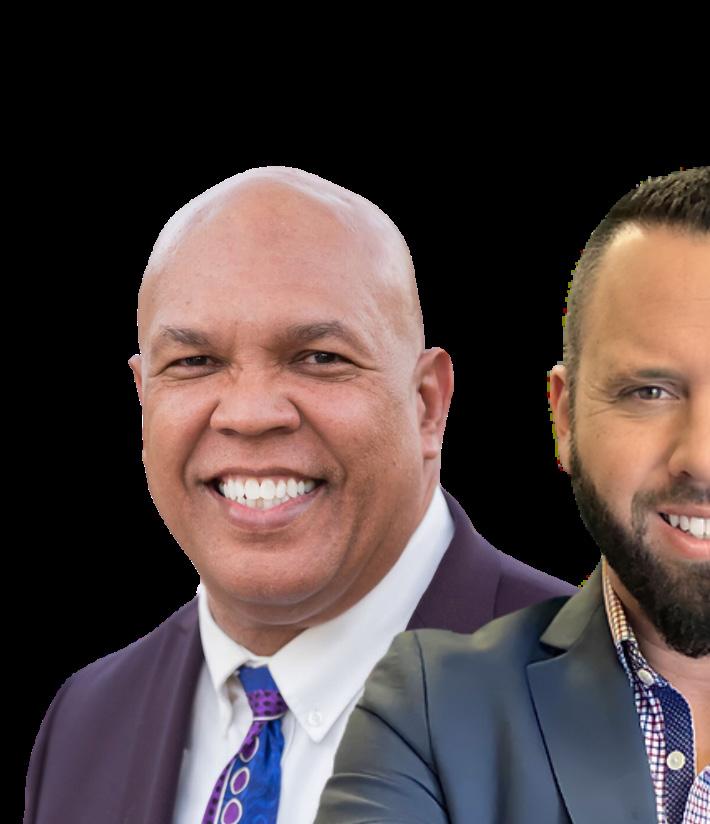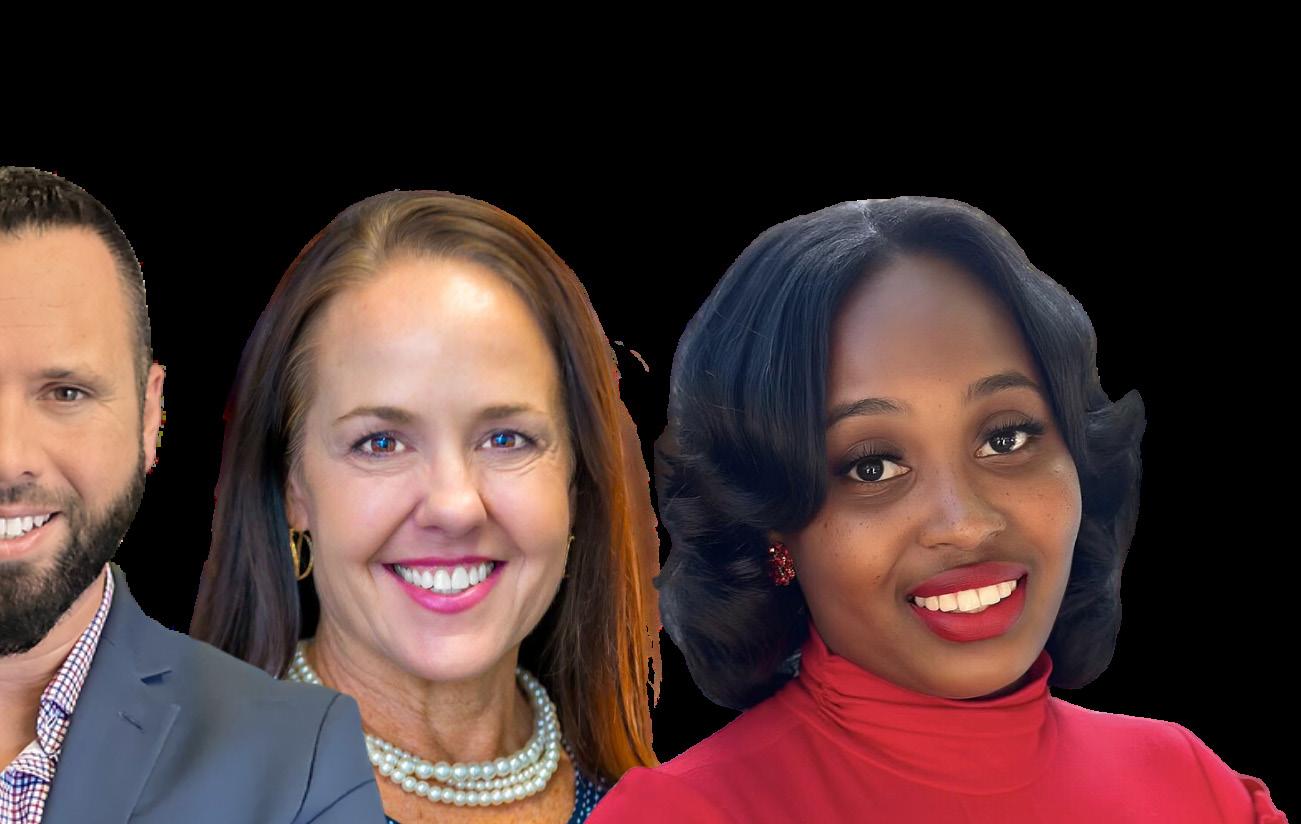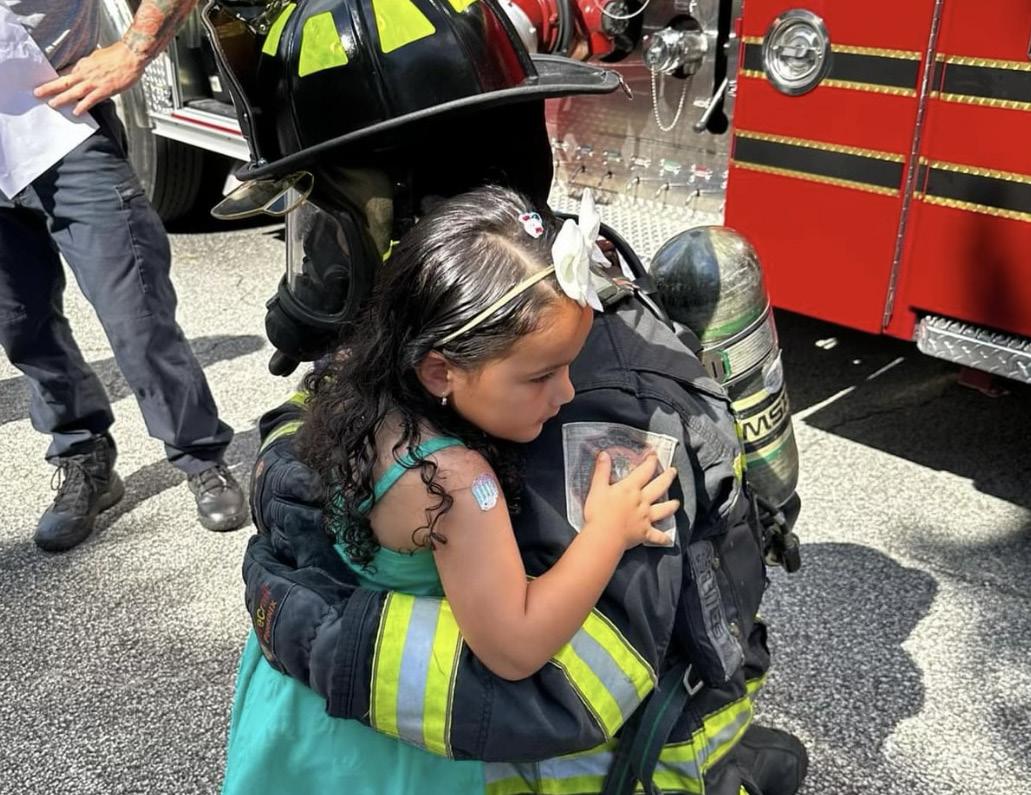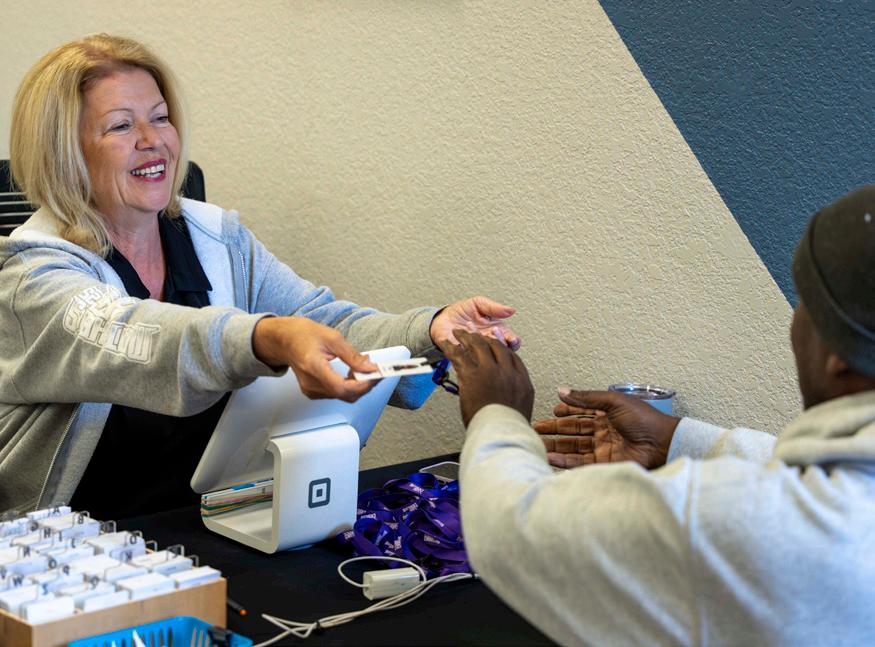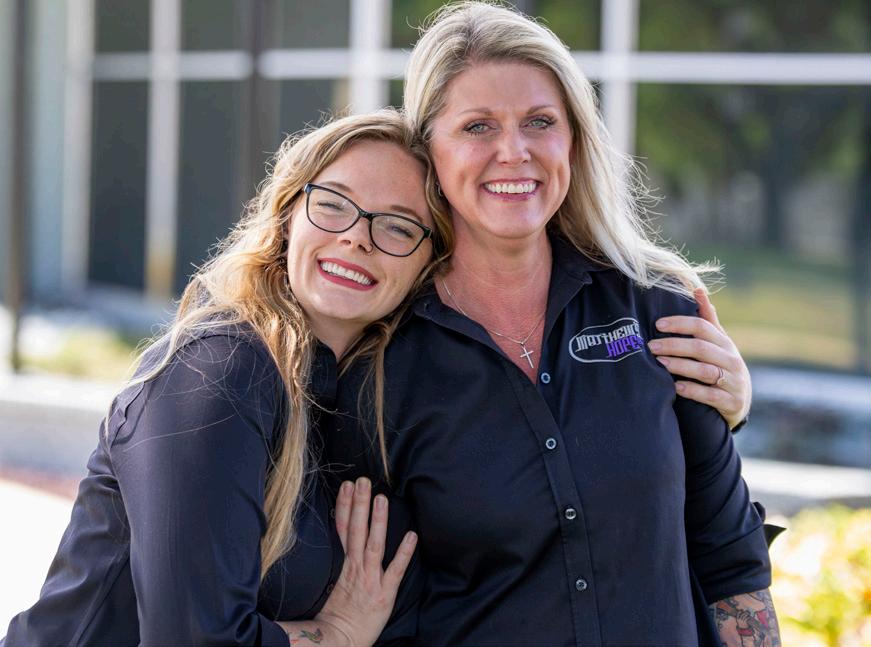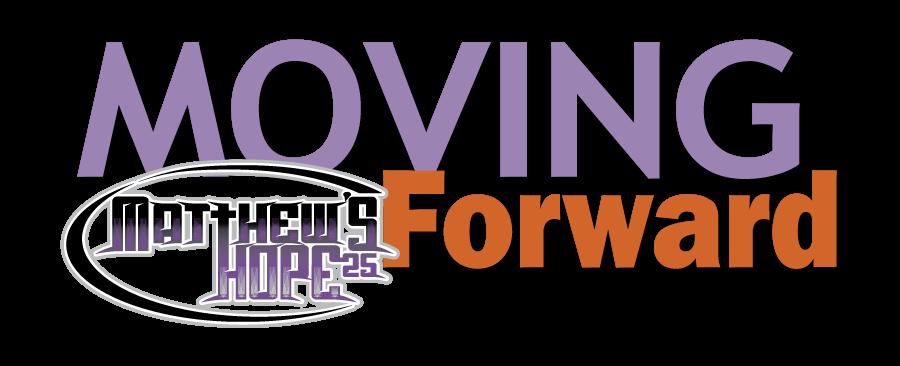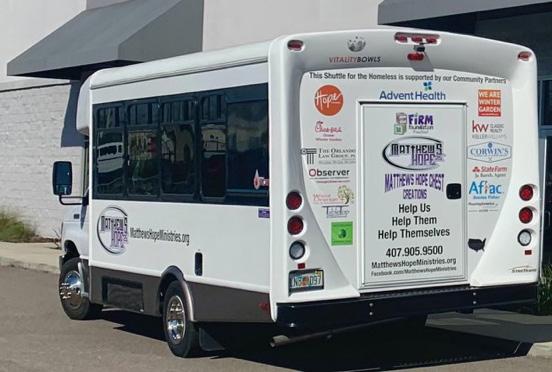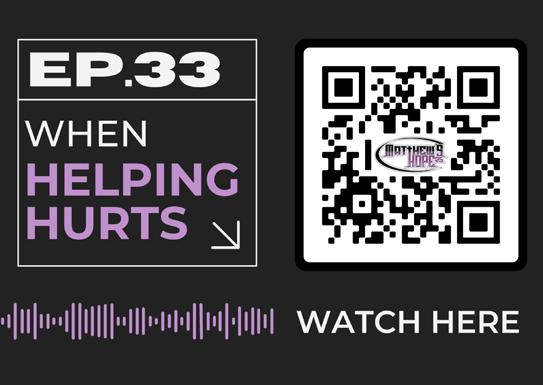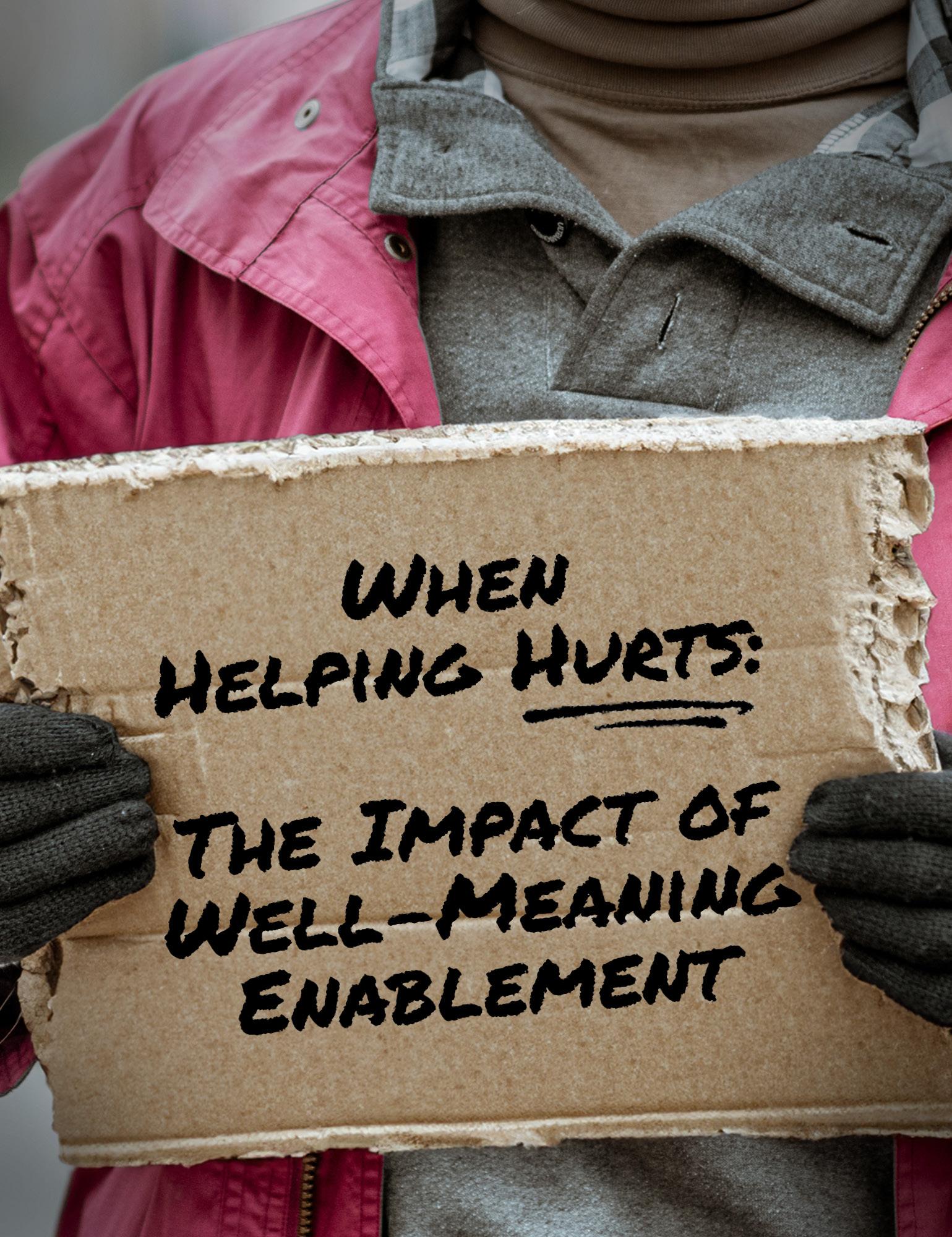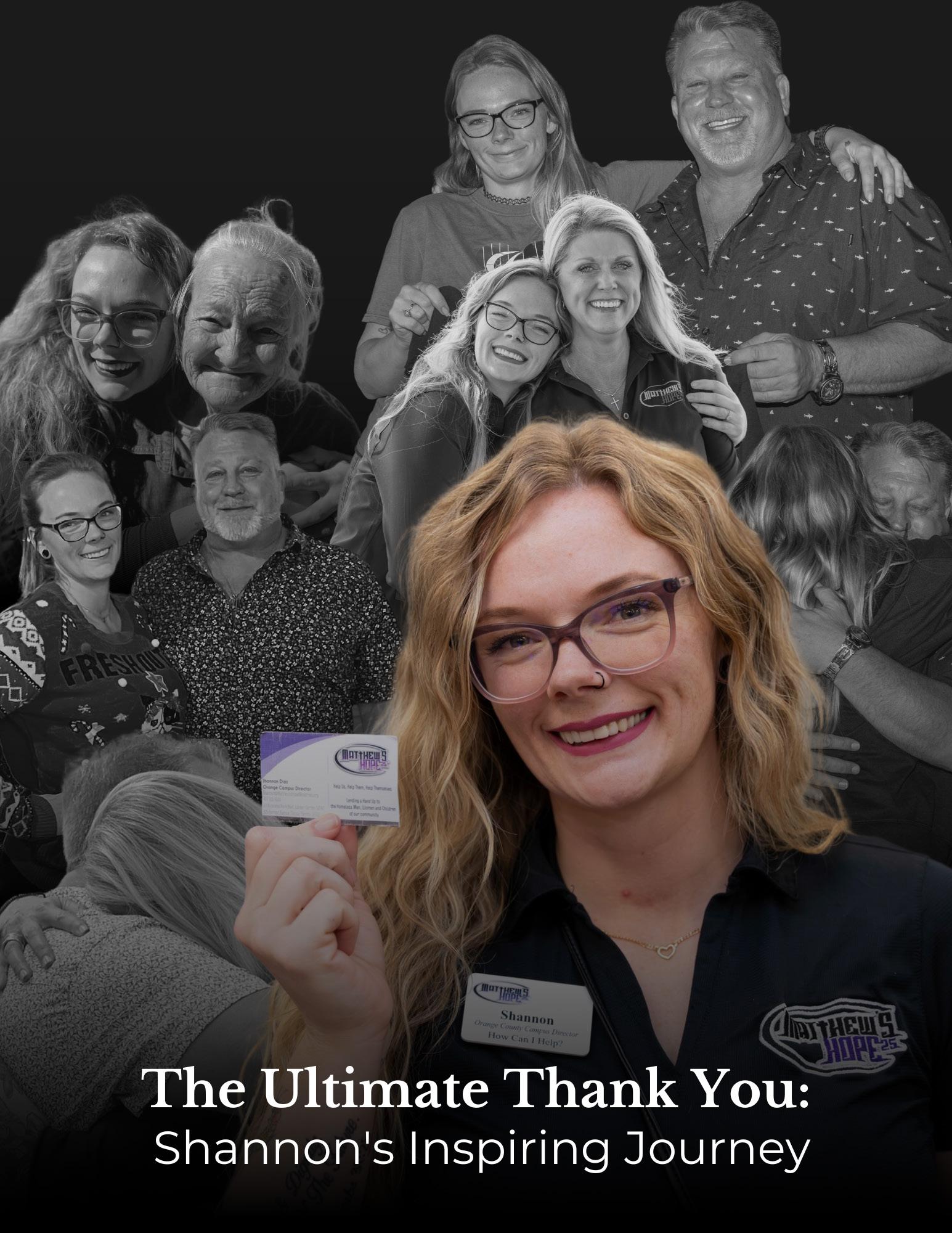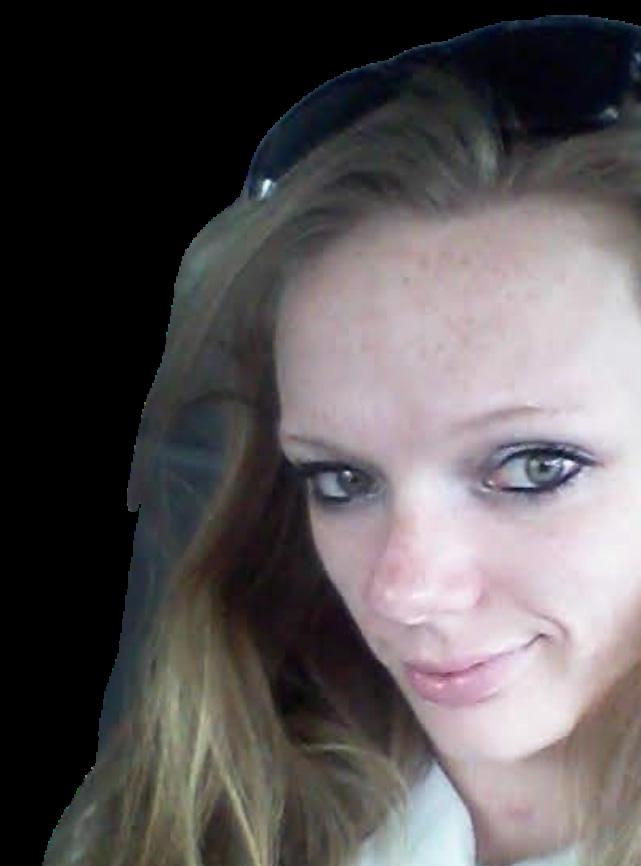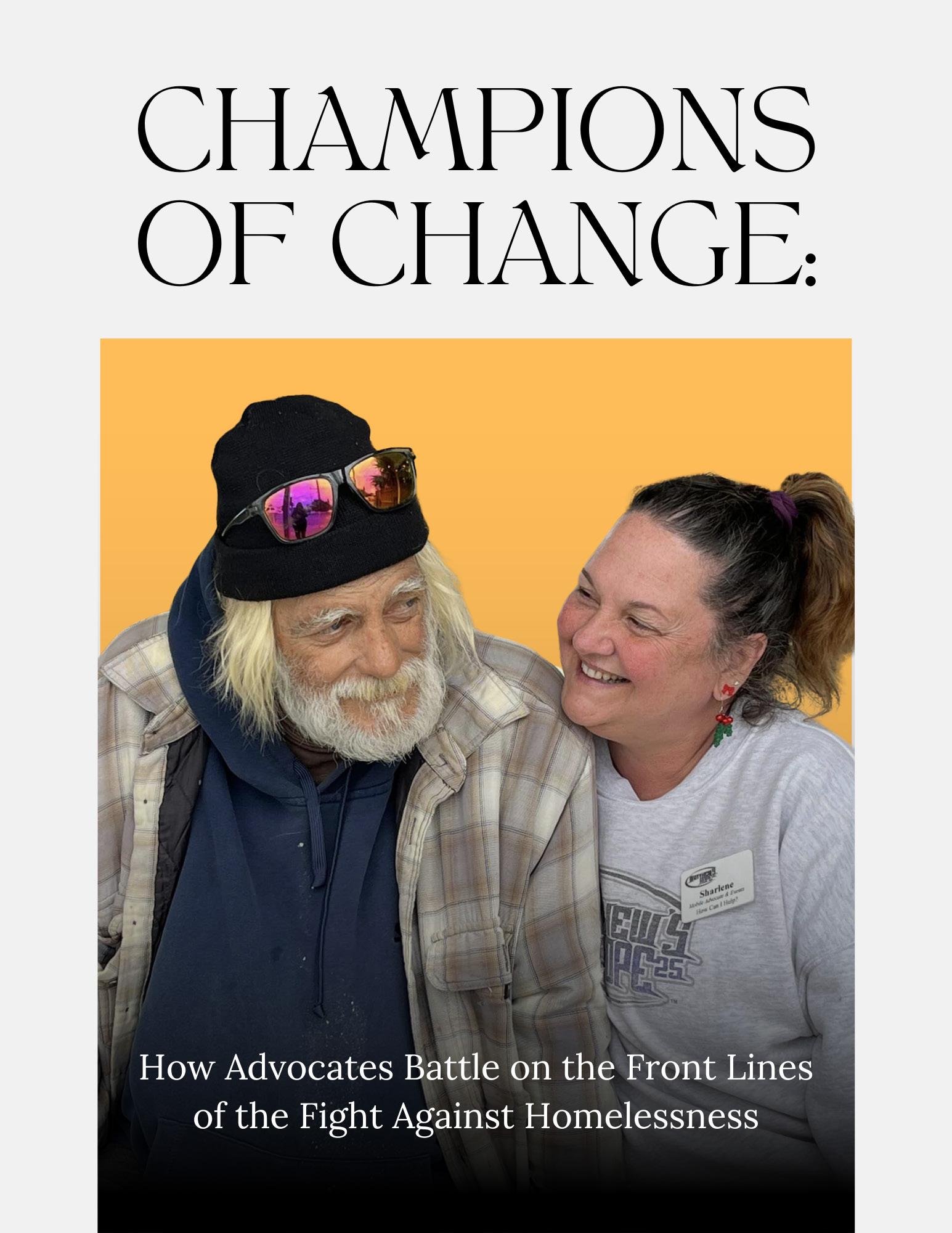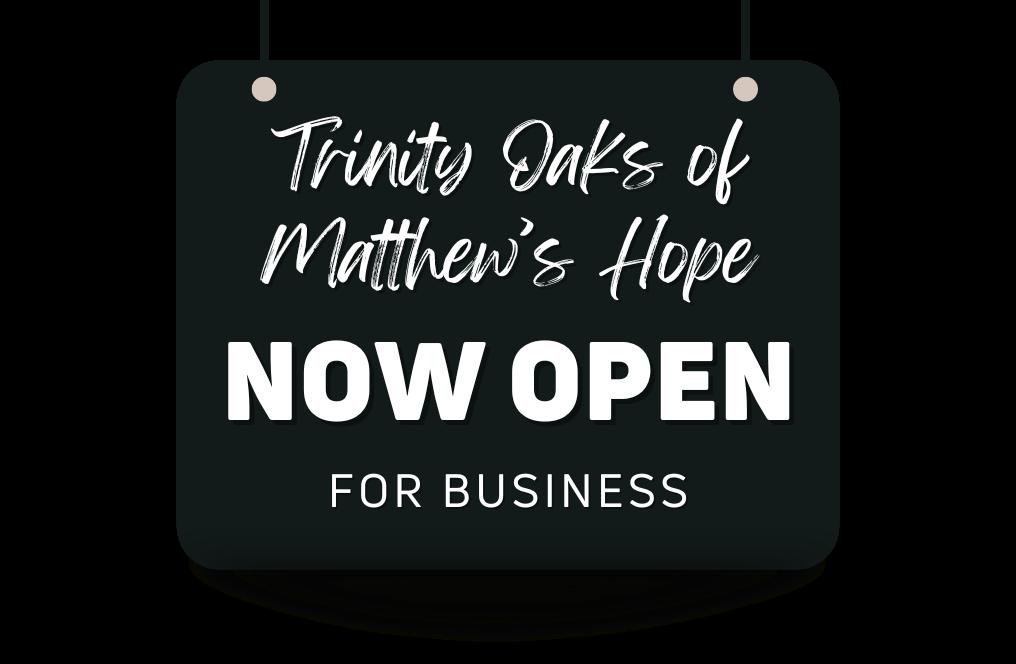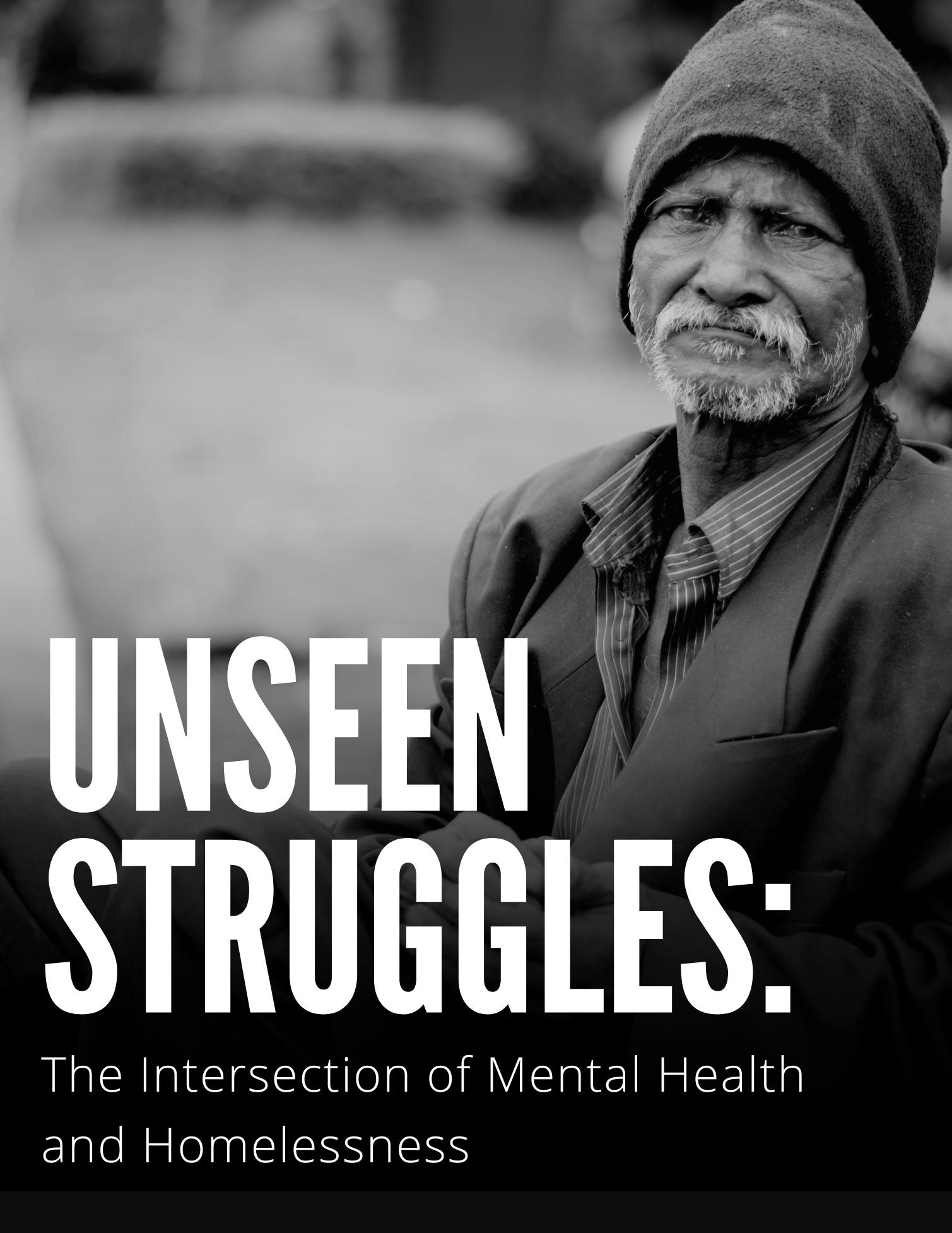OUTREACH BUS
In the realm of community support and charity, the line between helping and hurting can sometimes blur. Community organizers and members often find themselves grappling with the question of how to truly aid those in need. Is it enough to provide handouts, or is there a deeper, more sustainable way to foster progress and independence? This dilemma is central to the mission of many organizations, including Matthew’s Hope.
The Perils of Enabling Over Empowering
When aid takes the form of handouts rather than tools for self-sufficiency, it can unintentionally create dependency. While immediate relief is important, it often fails to address the root causes of poverty and hardship. Over time, individuals who rely solely on handouts may find it difficult to break free from the cycle of dependency, hindering their long-term growth and potential.
Matthew’s Hope recognizes this critical issue and has structured its initiatives to avoid the pitfalls of enabling dependency. Instead, they focus on empowering individuals with the resources and skills needed to achieve self-sufficiency. This approach not only addresses immediate needs but also lays the foundation for lasting change.
The Moving Forward Program
The Moving Forward Program is at the core of Matthew’s Hope’s mission. This program is designed for individuals who are committed to improving their circumstances and are willing to take concrete steps toward independence and self-sustainability. From job training to life skills workshops, Moving Forward provides participants with the tools they need to succeed on their own.
Key Elements of the Moving Forward Program:
Personal Responsibility: Participants
are encouraged to take ownership of their progress and are held accountable to fulfill specific requirements.
Skill Development: Through various workshops and training sessions, individuals acquire valuable skills that enhance their employability and self-reliance.
Supportive Environment: The program offers a supportive community where participants can learn, grow, and find encouragement from both peers and mentors.
The Vital Role of Community Support
Organizations like Matthew’s Hope rely heavily on the support of volunteers and donations to sustain their operations. Funding from donations and occasional grants is essential for maintaining the services and programs that help individuals move forward. However, the decrease in volunteer numbers post-pandemic has posed a significant challenge.
Why Community Involvement Matters:
Sustaining Operations: Continuous financial support ensures that programs like Moving Forward can operate effectively and reach more individuals in need.
Volunteer Engagement: Volunteers are the backbone of many community initiatives. Their involvement not only helps run day-to-day operations but also creates a network of support for participants.
Building a Better Community: By contributing time, talents and treasures, community members play a direct role in fostering a more resilient and self-sufficient community.
Moving Forward Together
Empowering individuals to achieve independence requires a collective effort. It involves shifting the focus from temporary relief to long-term solutions, emphasizing personal responsibility, skill development, and an end-goal. Programs like Moving Forward at Matthew’s Hope exemplify this approach, highlighting the importance of providing tools for self-sufficiency rather than mere handouts.
The road to empowerment is paved with challenges, especially in the wake of the pandemic. Yet, with steadfast community support, the goal of fostering independence and growth is within reach. Matthew’s Hope stands as a beacon of how targeted, thoughtful assistance can make a profound difference.
Join Us in Making a Difference:
Whether you’re a community organizer, a volunteer, or simply someone who cares about making a positive impact, your involvement is crucial. Consider donating, volunteering, or simply spreading the word about the importance of empowering, not just helping.
Together, we can ensure that our efforts truly uplift those in need, helping them move forward into a future of independence and self-sufficiency.
By Scott Billue
I lay awake many nights wondering, what if? What if Matthew’s Hope didn’t exist?
Would people notice? Would they care? What if we didn’t serve the hundreds of homeless men, women, and children each week? What would happen to Winter Garden, Ocoee, and Cocoa, FL?
Sometimes I wonder, what if Matthew’s Hope is its own worst enemy. Perhaps many in the communities we serve don’t notice the homeless crisis in Central Florida because we do a great job of “hiding the homeless in plain sight”. What if we stopped giving the homeless showers, haircuts, and clean clothes? What if rather than providing
transportation to our facility, we just let everyone just stay where they are?
We don’t have to provide hot meals and a food pantry? What if we just let each community handle the problem on their own? What if we didn’t provide medical attention and mental health counseling? What would happen then?
At some point during the night, I fall back to sleep only to wake up a few hours later with the realization that the sad truth is looking back at me in the mirror. I don’t have the luxury to say, “What if”. I know that as soon as we open our doors in the morning, there will be a line. A line of homeless individuals, each of them has a story. Every one of our homeless guests has needs. Some of the needs are small. A bus
ticket, so we can reconnect them with family in a different State. Other needs are more complex. Like our homeless veterans suffering with both physical and mental disorders. Each one of our guests is hungry and tired. They need our support. Really, they need your support.
So, what if? What if we came together as a community? What if rather than saying “not in my back yard” we had compassion and loved our neighbors? What if we worked together to solve the homeless crisis rather than blaming others?
We shouldn’t have to ask, “What if”. Instead, we should ask, “Why not”.
In our bustling cities and communities, it’s all too easy to pass by those experiencing homelessness without a second thought. But this lack of empathy, often fueled by societal stereotypes, has profound consequences. The dehumanization of homeless individuals isn’t just a moral failing—it’s a societal issue that demands urgent attention and action.
Understanding Dehumanization
Dehumanization occurs when we strip people of their humanity, viewing them as less than human. For those experiencing homelessness, this often means being seen merely as “the homeless” rather than as individuals with unique stories and challenges. Common assumptions—like laziness, drug addiction, or personal failure—oversimplify complex situations and ignore the myriad reasons someone might lose their home.
The Real Impact
Dehumanizing the homeless can lead to:
Mental Health Decline: Constantly being ignored or looked down upon exacerbates feelings of worthlessness and depression.
Social Isolation: When society turns a blind eye, those in need become increasingly isolated, making it harder for them to seek help.
Barriers to Support: Dehumanization can result in less public support for policies and programs aimed at helping the homeless.
Examples of Dehumanization
Consider how often we see homeless individuals and immediately jump to conclusions. We might assume they are homeless due to poor choices, without considering factors like:
Economic downturns
Lack of affordable housing
Chronic illnesses
Mental health issues
Proactive Solutions
Addressing homelessness requires more than just sympathy—it demands action. Here are some key solutions:
Invest in Mental Health Support: Providing accessible mental health services can address one of the root causes of homelessness.
Opportunities for Self-Sufficiency: Programs that
offer job training and placement help individuals regain their independence.
Matthew’s Hope: A Beacon of Support
Matthew’s Hope is an organization committed to innovative and compassionate solutions. One such initiative is “Pastor Bucks,” which helps the homeless access essential resources. This program is a testament to the power of community-driven efforts.
How You Can Help
Make Eye Contact: Acknowledge homeless individuals as fellow humans.
Volunteer: Offer your time and skills to local shelters and support organizations.
Get Involved: Advocate for policies that address the root causes of homelessness.
Invest in Your Community
By supporting organizations like Matthews Hope, you’re investing in your community. With Matthew’s Hope’s commitment to giving a hand-up, rather than a hand-out, you will witness the impact of your investment. Become a sustaining donor today and help make a lasting difference.
Dehumanization is a barrier we must break down to foster a more compassionate society. By investing in organizations like Matthew’s Hope, we aren’t just helping the homeless— we’re reinvesting in our community and supporting our fellow humans.
In a world where stories of transformation often feel like fleeting moments of hope, Shannon’s journey with Matthew’s Hope stands as a powerful testament to the incredible change that faith, perseverance, and community support can bring.
Shannon’s Transformation
Shannon’s life wasn’t always marked by the leadership and strength she exudes today. Once, her days were clouded by addiction and homelessness, a struggle that seemed insurmountable and which led to her having her kids taken away. It was during these dark times that Shannon found Matthew’s Hope, a sanctuary that provided more than just basic necessities—it offered dignity and respect.
Faith played an essential role in Shannon’s recovery. The unwavering belief that she could transform her life, as well as the support of advocates at Matthew’s Hope, fueled her journey from the depths of addiction to a place of stability and purpose. Last Winter, Shannon was able to invite Pastor Scott and Shelley to her own house for a dinner party which Pastor Scott describes as “the ultimate thank you.” Today, Shannon stands as the Orange County Campus Director for Matthew’s Hope, a remarkable achievement that underscores the power of faith and resilience.
The Importance of Dignity and Respect
At Matthew’s Hope, the ethos is clear—treat everyone with dignity and respect. This principle is not just a guiding light for their operations; it is the foundation upon which lives are rebuilt. Shannon’s story epitomizes this approach. By treating her with the respect she deserved, Matthew’s Hope provided Shannon with the emotional and psychological support needed to reclaim her life.
Challenges and Perseverance
While Shannon’s story is inspiring, it also highlights the challenges faced by Matthew’s Hope in sustaining their ministry, especially during tough economic times. The organization relies heavily on donations and sustained giving to continue their mission.
Every contribution, no matter how small, makes a difference in the lives of those served by Matthew’s Hope. The impact of sustaining donors cannot be overstated. Their consistent support allows Matthew’s Hope to budget effectively and ensure that their services are available to those in need. In times of economic uncertainty, this reliable funding is crucial to maintaining and expanding their outreach.
Growing Demand for Services
The demand for Matthew’s Hope’s services continues to grow. From mobile teams that provide essential services directly to those in need, to outreach days that offer a sanctuary for the homeless, the organization constantly adapts to meet the increasing needs of their community. Yet, with growth comes the need for more resources and support.
Call to Action
Matthew’s Hope thrives on the collective action and support of the community. The power of prayer and community involvement plays a critical role in facing the challenges and seizing opportunities for growth. Shannon’s transformation is a remind er of what is possible when a commu nity comes together to support those in need.
Every donation, prayer, and volunteer hour contributes to the mission of Matthew’s Hope. Together, we can help more individuals like Shannon find their path to recovery and lead ership. Your support can make a real difference.
Join us in sustaining this mission.
Whether through donations, volunteering, or simply spreading the word, your involvement matters. Let’s continue to offer hope and dignity to those in need.
Donate Now to support Matthew’s Hope and be a part of stories like Shannon’s.
Volunteer with us and make a direct impact in your community.
Pray for our mission and the individuals we serve, knowing that every act of faith and compassion helps pave the way for transformation.
Together, we can create a future where everyone has the opportunity to thrive.
Shannon’s story is not just a testament to personal transformation but a powerful reminder of the collective effort required to sustain and grow such impactful missions. Let’s stand together with Matthew’s Hope, providing the support needed to foster change and offer hope to those who need it most.
Before Hope:
Shannon’s dramatic transformation reveals the impact of organizations like Matthew’s Hope.
In a world where the gap between the haves and have-nots continues to grow, the role of advocates in supporting vulnerable populations cannot be overstated. At the forefront of this battle against homelessness is Matthew’s Hope, a beacon of hope for countless individuals who find themselves without a roof over their heads. This article sheds light on the indispensable work done by
support services provided by Matthew’s Hope is extensive. Advocates assist individuals in obtaining essential documents such as licenses and birth certificates, which are crucial for accessing other forms of assistance. Advocates identify individuals that are a good fit for the Moving Forward Program and then help usher them towards their goal.
Each individual’s end goal is different and Advocates at Matthew’s Hope aim to help them achieve success in whatever form it takes. This holistic approach ensures that every aspect of an individual’s well-being is addressed, laying the groundwork for long-term stability and self-sufficiency.
Building Relationships
At the heart of Matthew’s Hope’s advocacy is the relationship-building process. Advocates understand that trust and genuine connections are essential for effective support. Many people view those experiencing homelessness with disgust or disdain, but Advocates at Matthew’s Hope.
They invest time in getting to know each individual, understanding their unique challenges, and providing personalized assistance. This empathetic approach not only helps in addressing immediate needs but also empowers individuals to take positive steps towards improving
Community Liaison Work
Advocates at Matthew’s Hope also serve as vital liaisons between the homeless community and local authorities, businesses, and organizations. By fostering collaborations and partnerships, they work towards creating a more cohesive
and supportive network to address homelessness. This community-oriented approach ensures that resources are effectively utilized, and efforts are coordinated to maximize impact.
The Importance of Community Support
The work of Matthew’s Hope is predominantly funded by donations and community support. Public contributions are the lifeblood of their operations, enabling them to continue providing essential services to those in need. The importance of collective action in facilitating change cannot be emphasized enough. Every donation, no matter how small, makes a significant difference in the lives of individuals experiencing homelessness.
Join us in this mission. Learn more about Matthew’s Hope and find out how you can contribute to creating a more inclusive and supportive community for all.
Matthew’s Hope is pleased to announce that Trinity Oaks is now open for business. So why is a homeless ministry operating an event venue? The answer is quite simple. When you have a beautiful campus in Cocoa, FL with a sanctuary, you book it. The revenue generated from booking the facilities will offset the ongoing cost of operations.
Trinity Oaks Event Venue is an idyllic destination located in the heart of Cocoa, FL. Our picturesque venue offers the perfect setting for your dream event, whether it be a breathtaking wedding ceremony, a corporate function, or a celebratory gathering with loved ones.
As an independent, faith-based ministry, we are dedicated to providing exceptional service to all our guests. With stunning indoor and outdoor spaces, we offer a range of customizable options to suit your needs and preferences. Our team is passionate about making your event truly unforgettable, and we are committed to working closely with you every step of the way.
Trinity Oaks has an event rental package for every budget. Packages range from just $500 for a Chapel Only rental to $4500 for events with up to 230 guests. Venue packages include the Ceremony Sanctuary, Courtyard, Reception Hall, and Bridal Suites. Trinity Oaks has assembled a list of preferred vendors from caterers, florists, live entertainment, and so much more. For more information about Trinity Oaks, please contact Courtney at courtney@trinityoaksvenues.org.
Understanding the Invisible Scars
In the heart of our community, Matthew’s Hope stands as a beacon of hope for many who have lost their way. But behind every face we see lies a story filled with pain, heartache, and unresolved trauma. Our homeless guests often arrive with invisible scars, remnants of their past that continue to haunt them. These scars are not just emotional wounds but are deeply embedded in their very being, shaping their present and future
The Shadows of Abuse
A significant number of our guests spent their formative years in abusive households. The abuse they endured—whether sexual, mental, or physical—cast long shadows over their lives. Imagine growing up in an environment where trust is shattered daily, where every touch, word, or action could be a weapon. These experiences leave deep psychological scars that do not heal easily. The constant fear, anxiety, and lack of safety erode their sense of self-worth and trust in others.
The Weight of Loss
For many, the trauma is compounded by profound losses. The death of a child, spouse, or parent can be a devastating blow, one that many never fully recover from. The weight of such a loss can lead to a downward spiral, where the grief becomes too much to bear. In their grief, they may turn to unhealthy coping mechanisms, further alienating themselves from their support systems and the life they once knew.
The Vicious Cycle of Trauma
Trauma doesn’t exist in isolation. It often sets off a chain reaction, affecting every aspect of a person’s life. Many of our guests at Matthew’s Hope have found themselves caught in a vicious cycle of trauma, where one traumatic event leads to another. For example,
a person who has experienced abuse might struggle with addiction, unemployment, or unstable relationships— all of which can lead to homelessness. This cycle is incredibly challenging to break without intervention and support.
The Role of the Community
Addressing and healing trauma is not something that can be done in isolation. It requires the collective effort of the community. Advocates play a crucial role in this healing process.
By understanding the root causes of homelessness and the trauma that perpetuates it, we can develop more effective support systems.
Creating Safe Spaces
One of the most important steps we can take is to create safe spaces for our homeless guests. At Matthew’s Hope, we strive to provide an environment where individuals feel secure and supported. This includes offering trauma-informed care, where staff and volunteers are trained to recognize and respond to the signs of trauma. By creating a safe and nurturing environment, we can help our guests begin the healing process.
Providing Comprehensive Support
Healing from trauma requires a multifaceted approach. It’s not just about providing shelter and food, but also offering mental health services, addiction support, and opportunities for personal growth and development. At Matthew’s Hope, we work to provide comprehensive support that addresses the many facets of trauma. This includes counseling services, support groups, and access to healthcare and educational resources.
Building Strong Relationships
Trust is a critical component of healing. Many of our guests have experienced betrayal and abandonment, so
building strong, trusting relationships is vital. This takes time and patience, but it is essential for creating a sense of belonging and community. At Matthew’s Hope, we work to build these relationships through consistent, compassionate care and by demonstrating that we are here for the long haul.
How You Can Help
The fight against homelessness and the trauma that accompanies it is a community effort. There are several ways you can get involved:
Volunteer your time and skills to support our programs and services. Donate to help us provide the resources needed for comprehensive care.
Advocate for policies that address the root causes of homelessness and support trauma-informed care. Educate yourself and others about the realities of homelessness and the impact of trauma.
By working together, we can create a community where everyone has the opportunity to heal, grow, and thrive.
The stories of our homeless guests at Matthew’s Hope are a testament to the enduring human spirit. Despite the immense challenges they face, many continue to strive for a better life. By understanding the trauma that underlies homelessness, we can better support those in need and work towards a future where everyone has a place to call home. Join us in this mission—together, we can make a difference.
If you want to make a positive impact in the lives of those struggling with homelessness and trauma, visit our website to learn more about how you can get involved. Your support can change lives.
By Sarah Dewitz
At Matthew’s Hope, the tales of those we encounter are often poignant reminders of the fragility of life on the streets. One such story underscores the harrowing reality faced by many individuals trapped in the cycle of homelessness. This is a story about Michelle, a guest who was near and dear to many at our Brevard Campus.
Less than 24 hours after being released from jail due to a drug possession charge, Michelle was found dead on the side of US-1. An overdose. Just two weeks before her 34th birthday.
Michelle had been a familiar face at Matthew’s Hope, seeking refuge from the streets and occasional solace in the services we provide. Her struggles were emblematic of the issues we confront daily: the trauma of past experiences, the burdens of untreated mental health conditions, and the allure of substances as a means of coping.
Upon her release from jail, Michelle faced a daunting reality. With no stable housing awaiting her, she returned to the streets, where the temptations and dangers of substance use loomed large. In addition, there was reason to believe Michelle had her life threatened multiple
times, as well as being physically and sexually abused. This is after a Judge in Pinellas County denied an Ex Parte guardianship application due to her being baker acted. How was she to overcome the challenges on the street when the legal system didn’t even bat an eye?
For Michelle, as for many others in similar circumstances, the streets offered little respite. Faced with the overwhelming pressures of survival and the numbing effects of addiction, she succumbed tragically and swiftly to the perils that awaited her. To break this cycle, a comprehensive approach is necessary—one that addresses both the immediate needs of the homeless population and the underlying causes that lead to homelessness and substance use. This includes expanding access to mental health services tailored to the unique challenges faced by homeless individuals, increasing affordable housing options, and combating the stigma that prevents people from seeking help.
At Matthew’s Hope, Michelle’s passing has stimulated our commitment to advocate for systemic change and to expand our efforts in providing support to those who walk through our doors. We have hired a mental health counselor to do what we can to help those in similar mindsets. Our goal is to ensure nobody thinks of one of our struggling guests as “just another dead junkie”. Her memory reminds us of the human faces behind the statistics—a life lost, a potential unfulfilled, a child of God, and a community left mourning yet another tragic loss.
As we reflect on Michelle’s story and the countless others like hers, we renew our resolve to continue the fight against these heartbreaks. Every life lost is a call to action—a call to build a society where stories like Michelle’s
are not a predictable outcome but a challenge to overcome through collective effort and genuine care.
Moreover, it requires a shift in societal attitudes, moving away from judgment and indifference towards compassion and support. Every life lost to the debilitating disease of addiction is a stark reminder of the cost of neglecting those who are most vulnerable in our communities.
Behind every statistic and every headline lies a human story—a story of struggle, resilience and, unfortunately, tragedy. “Just another dead junkie” should not be an accepted fate but a rallying cry for change to confront the complex web of issues that entangles homelessness, mental health, and substance abuse. Until we address these interconnected challenges with empathy and action, the pattern will persist, claiming more lives and perpetuating the cycle of despair on our streets.
Homelessness and mental health are two deeply interconnected issues that demand our urgent attention. For many, the struggle with mental health doesn’t just precede homelessness; it perpetuates it. Understanding this tangled web is essential for policy makers, community leaders, and the general public, as we collectively work towards solutions.
The Intersection of Mental Health and Homelessness
Imagine living without a roof over your head, shelter from the elements, or a place to call home. Now, compound that with the weight of untreated mental health issues. For many experiencing homelessness, this is a daily reality. Research indicates that a significant portion of the homeless population grapples with mental health challenges, ranging from depression and anxiety to severe conditions like schizophrenia and bipolar disorder. These individuals find themselves in a vicious cycle where their mental health issues make it difficult to find and maintain stable housing, and their lack of housing exacerbates their mental health struggles.
Challenges Faced by Individuals in Need of Mental Health Care
The challenges are multifaceted. Homeless individuals often face stigma, limited access to healthcare, and a shortage of mental health professionals. The lack of stable
struggles, reducing donor contributions and straining resources.
Matthews Hope: A Beacon of Support
In the midst of these challenges, organizations like Matthews Hope are making a difference. Relying heavily on community donations for funding, Matthews Hope provides essential services to those experiencing homelessness, including medical care and mental health support. This holistic approach addresses not just the symptoms but the root causes of homelessness.
Community Support and Funding
The pandemic’s impact on donor contributions has been significant, but hope remains. Every dollar donated is an investment in your community. With Matthew’s Hope’s commitment to giving a hand-up, rather than a hand-out, you will witness the impact of your investment. Please consider becoming a sustaining donor today with your monthly gift.
Essential Services and Support
Matthews Hope focuses on providing a range of services tailored to the unique needs of the homeless population. These services include:
Medical Care: Ensuring immediate health needs are met.
Mental Health Support: Providing counseling, therapy, and psychiatric services.
support provided.
Addressing the Shortage of Mental Health Professionals
One of the critical challenges highlighted is the shortage of mental health professionals willing and able to work with the homeless population. This gap is particularly concerning given the complex needs of these individuals. More trained professionals are essential to provide the consistent and compassionate care required.
Community Events and Fundraisers
The community can also support Matthews Hope through events such as the Orange County Campus Garden Party and the Bard Campus Speak Easy fundraiser. These events not only raise essential funds but also foster a sense of community and shared purpose.
Call to Action
The intersection of mental health and homelessness is a critical issue that requires collective action. Policy makers, community leaders, and the general public all have roles to play.
By supporting organizations like Matthews Hope, you’re investing in your community. With Matthew’s Hope’s commitment to giving a hand-up, rather than a hand-out, you will witness the impact of your investment. Become a sustaining donor today and help make a lasting difference. Let’s come together to ensure that
On Thursday, April 18th, Matthew’s Hope Founder and CEO, Scott Billue, announced that they have named Shelley Bradford as the new President. Shelley previously served as Executive Director and then became Vice President of Matthew’s Hope Ministries.
Shelley Bradford, who originally joined Matthew’s Hope Ministries in 2018 as a receptionist, has truly worked her way up and has made a lasting impact in her time there. Thanks to her steadfast commitment and dedicated leadership, the Board of Directors confirmed the appointment of Bradford as President of Matthew’s Hope Ministries, effective immediately.
“Naming Shelley Bradford our President, in addition to Executive Director of our two campuses, is an affirmation of the role she truly plays at Matthew’s Hope. I’m proud to have Shelley as my partner in creating and moving forward the vision that God placed on my heart nearly 14 years
ago” stated Scott Billue, Founder and CEO of Matthew’s Hope. “I could not and would not attempt the expansion to the second campus, now serving the Central Brevard County community without her. I can also say that it is very likely that much of what has taken place with our growth in these past five years would not have happened without her involvement.”
Scott Billue continued, “I love her, I respect her, and I admire the person she is. I am truly blessed that she walked through our doors when she did and that is a story within itself.” Trained as a crisis responder by the National Guard, Shelley is also a human behavior specialist, a certified master life coach with certifications in leadership, relationships, parenting, health and wellness. She also is a graduate of Light University and of Leadership West Orange.
Shelley Bradford’s first mission is to streamline operations between both campuses and make them more efficient so more dollars will be available for the guests. She wants to continue to raise awareness for the homeless in our community. Shelley wants people to recognize that many of us are only one paycheck away from poverty. In addition to her role as President of Matthew’s Hope Ministries, Shelley will continue to serve on the Board of Directors of the West Orange Chamber of Commerce.
Shelley is happily married to her husband Darren and has three children - Amanda, Thomas and Meyer. She is a proud supporter of the arts and has been involved with local Orlando theaters in various acting roles; her entire family is active in CrossFit and powerlifting. Shelley would like to thank her husband, family, and the whole Matthew’s Hope team for their continued support.
Scott Billue and Shelley Bradford put out an open invitation to local politicians and candidates to be guests on the Straight Talk, No B.S., with Matthew’s Hope podcast to discuss the growing homeless crisis in our area. Topics included what plans they have to address the homeless crisis in Central Florida; if the politicians did not
have a plan, why not? and finally, the politicians, Scott, and Shelley, went in-depth into the new anti-camping bill that was recently passed into law in Florida and how it will impact our communities.
While none of our local political leaders had a magical solution, Matthew’s Hope appreciated the open dialogue and their willingness to participate. Here are some of their responses. Make sure to watch the full podcasts by scanning the QR Codes.
Pastor Scott and Shelley share their experiences from operating Matthew’s Hope Ministries, a homeless outreach in Florida’s Orange and Brevard Counties to raise awareness and tackle some of the biggest misconceptions surrounding the homeless crisis in America.
On a recent episode, Pastor Scott and Shelley react specifically to several social media posts made by John McEntee, a prominent conservative political advisor that may be tasked with filling up to 4,000 government appointed positions in the next Republican administration. After watching a disturbing clip of John McEntee, where John hands out fake money to homeless people and states:
“I always keep this fake Hollywood money in my car so when a homeless person asks for money then I give him like a fake five dollar bill so I feel good about myself, they feel good and then when they go to use it they get arrested. So I’m actually helping like clean up the community you know, getting them off the streets.”
Shelley’s immediate reaction, “Wow”.
Pastor Scott responded, “His mother should be proud”.
These are the type of topics that represent “straight talk” that Pastor Scott and Shelley discuss on a weekly basis. The podcast is hosted by Tracy Lewis, We Are
Winter Garden and is produced by Jon Burket, Imagine Marketing. The team tackles tough issues each week in an effort to bring real awareness, with No B.S. to the homeless crisis in America.
Please tune in each week. The podcast is now playing on all the major platforms including YouTube, Spotify, Amazon, Apple, and more.


